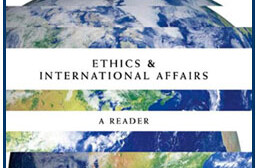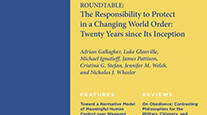This book review was published in International Journal, Autumn 2009 Issue (a Canadian International Council publication). It is reprinted here with kind permission.
This is the third edition of the popular Ethics & International Affairs readers. Ten years have passed since the second edition, and as scholar Chris Brown states on the back of the latest edition, the editors have "extensively revised" the collection. Like its forerunners, it collects recent articles from the journal Ethics & International Affairs, some of which are updated and slightly revised, and organizes them into four parts. Part I, on conflict resolution, includes contributions on realism (David Hendrickson), preventive war (Neta Crawford), and accountability and reckoning with past wrongs (David A. Crocker). Part II covers grounds for intervention, including essays that provide an overview of the topic (Michael Smith), the moral basis for intervention (Terry Nardin), the responsibility to protect in relation to Iraq and Darfur (Alex Bellamy), and a chapter on ecological intervention (Robyn Eckersley). Part III, on governance, law, and membership collects essays on global governance institutions (Allen Buchanan and Robert Keohane), democracy and international law (Seyla Benhabib), global justice for women (Alison M. Jaggar), and the ethics of immigration laws (Joseph H. Carens). Part IV, on global economic justice, includes chapters on models of international economic justice (Ethan B. Kapstein), American empire (Robert Wade), accountability in development aid (Leif Wenar), and three chapters of an exchange between Thomas Pogge and Mathias Risse on world poverty and human rights.
In their preface, Rosenthal and Barry, who also edit the journal, note that their selections are neither the "greatest 'hits' of international ethics, nor the greatest 'misses' of global public policy,” nor do they necessarily address "the most pressing" issues. Rather, the selections are intended to be "conversations…taken as invitations to normative, empirical discussions," and to ultimately balance between "supply[ing] a volume fit for the ethics classroom, and to reflect the growing maturity of the field" of international ethics (x).
If these are the standards by which scholars, practitioners, and even general readers should measure this third edition, there is much to commend it. For starters, this is a fantastic, easily accessible and well-written series of contributions. Despite the editors' modest prefatory remarks, these are selections from some of the most serious, vibrant, and esteemed scholars in today's field of international ethics. The essays, then, in addition to being straightforward, are still intellectually provocative and cover a wide range of topics. This makes this volume perfectly suited to courses on international ethics, of course, but with the impressive coverage it could be used as a supplementary text in global development, international law, human rights, and international organizations courses. Second, there is a very good mix of philosophical, theoretical, and empirical or issue-based chapters, which makes this fertile territory for practitioners and academics alike. There are some well-thought-out proposals, such as Crocker's notion of a general framework for accountability and Wenar's discussion of development aid accountability, that provide much normative food for thought. Further, certain selections—most especially the Eckersley chapter—examine a timely topic (ecology) via a well-rehearsed debate (intervention). There are some very minor issues one might notice in reading this volume. One relates to the pertinence of the selections. Humanitarian intervention, which was a topic on the front burner in the second edition, remains so here. Yet one gets the feeling that the debates over humanitarian intervention, debates the current reviewer has also participated in, have carried us only so far. While the volume's articles that cover the debate are exceptionally sophisticated, they seem to reflect on intervention in the light of an emerging "post-intervention" era.
Second, the breadth of the coverage is impressive, but the few issues treated in depth, as in the Pogge-Risse conversation about poverty and human rights (chapters 15-17), may have only limited appeal. Finally, the first two parts of the volume, on conflict resolution and intervention, seem to be more centred and homogenous than others, especially part III on governance, law, and membership.
I might mention in closing that these very minor criticisms of the volume stem from two factors, one subjective and one structural. Subjectively, I must admit that the second edition had an enormous impact on my early graduate training, and this probably contributed to my raised expectations for this third edition. The topics in that volume seemed to have a longer "shelf life," so to speak, than those in the third edition. This leads me to posit a structural factor, one that is no real fault of the editors or the contributors, however. The field of international ethics, and the world it studies, are arguably changing more rapidly now than ever before. Ethics was never truly on the margins of the fields of international relations or political science, but today there are a significant number of journals that seek out ethics-related topics. More and more normative debates appear in established international relations journals. It is telling, for instance, that one of the most influential mainstream scholars of our time—Robert Keohane—is a co-author of one contribution here. Thus, while this third edition could be considered just as big a fish as the second, the ethics pond within which it swims is now not only much larger, but much more dynamic as well. For this, we have the Carnegie Council to thank, not only for establishing the journal in 1987, but for all of its efforts to push forward ethics in international affairs.
Brent J. Steele/University of Kansas



